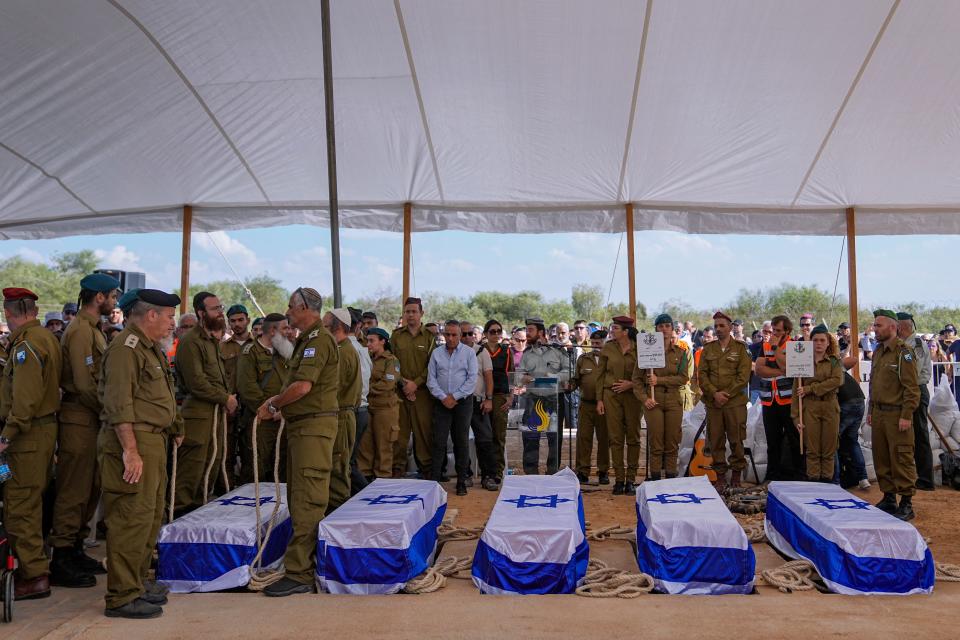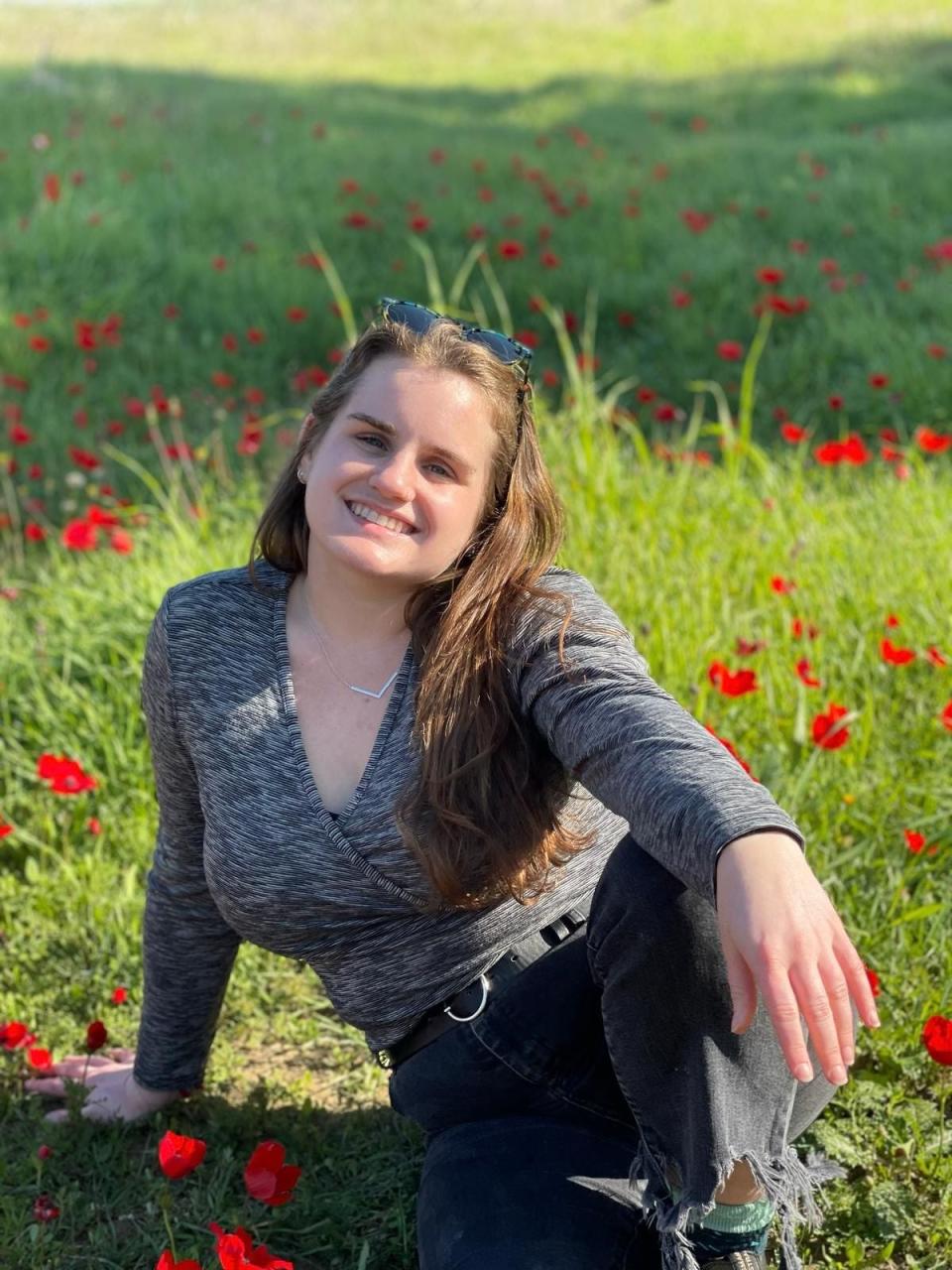‘Trying to heal:’ Weeks later, NJ survivor of Hamas attack still struggles with the trauma
Tali Gilberg is in mourning for the life she used to know.
She grieves for the friends, neighbors and relationships she relished. And she mourns the dreams she harbored for a peaceful coexistence with her neighbors, residing less than a mile away in Gaza.
Gilberg, 26, grew up in Livingston, New Jersey. Four years ago, she moved to Kibbutz Erez, a community in southern Israel that was attacked by Hamas on Oct. 7. On that day, hundreds of fighters stormed the border and killed more than 1,100 Israelis, kidnapped 240 and wounded hundreds more.
Everything about her life feels different now.

Today, Gilberg is among the roughly 240,000 Israelis who have been displaced from their homes by the terror attack and the ongoing conflict in Gaza, which has killed about 20,000 Palestinians. Gilberg is living with friends in a house south of Jerusalem, where she hopes she will have fewer nightmares, despite periodic rocket attacks and bouts of terrorism. Like many of her former neighbors, she is unsure what her future holds
"The attack has changed me," Gilberg said in a recent phone interview. "I'm still healing. I still haven't fully accepted that I'm a refugee now. I don't know when I can go back to my home."
Lives in Gaza and Israel, intertwined
It's not as if the years on the kibbutz were entirely peaceful — there were still air raid sirens and rockets that fell too close to her home in the desert. Yet Gilberg and many of her neighbors in southern Israel felt they shared a certain understanding with their brethren who lived just a few miles across the border in Gaza.
Many of the southern Israel residents employed Gazans in their homes or in the orchards they kept. Some ran peace organizations aimed at helping Palestinians; others sang songs about overcoming differences and told stories that spoke of a shared future.
Gazans toured Gilberg's cozy enclave of 600 residents to plan for a factory that they hoped would serve as a place for the two populations to work together. She would frequently see Gazans waiting at nearby bus stops as they came into Israel for work or medical care, she said.
Some residents of the southern community went out of their way to aid their Palestinian neighbors. Among them was Vivian Silver, an idealist and peace activist from Kibbutz Be'eri who earned fame for starting a grassroots movement that shuttled Gazans to Israeli hospitals. But Gilberg says Silver and many of their neighbors were betrayed by those they had attempted to befriend. Silver was killed by the terrorists on Oct. 7.

After the attack, detailed maps of the small towns in Gilberg's area were recovered from the bodies of dead Hamas fighters. The attack was aided by information by Gazan day laborers who were permitted to enter Israel for work, the Washington Post reported in October, citing intelligence officials. The maps documented the locations of schools, homes and supermarkets, Gilberg said.
"I thought we had a mutual understanding. I thought we had peace with them. Many people here were idealists who believed in coexistence," she said. "We believed many of them wanted peace just like we did.
"Now I see that all of it was a lie."
Palestinians railed against 'open-air prison'
In the communities hit most ruthlessly by the attack, residents have been forced to reexamine all of their notions about coexistence. The attacks on Israel and the resulting bombardment of Gaza have made the path toward peace seem more obscure than ever.
After winning 2006 parliamentary elections in the region, Hamas — which has long advocated for the annihilation of Israel — seized control of Gaza in 2007.
Israel has since imposed an economic and physical blockade on the territory due to fears of terrorist activity. Backed by Egypt, the Israeli government has restricted the import of goods they say could be used for weaponry and blocked many Palestinians from leaving Gaza. While foreign aid has poured into the region, Gaza has continued to be plagued by poverty, and Palestinian advocates have compared the tiny enclave to an "open-air prison" for the territory's 2.3 million residents. Hamas, meanwhile, has millions of dollars in assets.
Gilberg knows that not all Palestinians represent Hamas. But it's hard to ignore statistics like the one recently released by the Ramallah-based Palestinian Center for Policy Survey and Research, which found that roughly 72% of Palestinians said they supported Hamas' assault on Israel, while 22% said the decision to attack was "incorrect." The survey was conducted from Nov. 22 to Dec. 2, amid the deadly airstrikes in Gaza. The center noted that support for Hamas tends to grow during military conflicts with Israel and to wane at other times.

Raised in the Jersey suburbs, with a love of Israel
For Gilberg, it's a long way from the sense of idealism that drew her from the New Jersey suburbs, half a world away.
Gilberg grew up in a Reform Jewish family in Livingston that emphasized a love of Jewish tradition and of Israel. After a full day at public school, she would attend Hebrew school. She was particularly inspired by her Orthodox aunt and cousins - who were proud Zionists - and with whom she was close.
After graduating from Rutgers in 2019 with a degree in visual arts, Gilberg moved to Israel. Once there, she joined the army, figuring it would help her acclimate to Israeli society and learn Hebrew. She served as a photographer and video editor for the international social media team in the Israel Defense Forces' public relations unit.
She also joined a garin, a small group of foreign soldiers who lived together on Kibbutz Erez and created a family of their own while serving in the military together. Gilberg quickly fell in love with the quiet and natural beauty of the desert village.
She completed her army service two years ago and opted to remain on the kibbutz, where she had grown close with the tight-knit community.
"It was my happy place," she said.
More: Palestinian Americans cancel Christmas celebrations, pray for survival of Gaza's Christians
Hiding from Hamas for 13 hours
The morning of Oct. 7 shattered her sense of calm. Gilberg awoke early to the blare of sirens warning of incoming rockets. That wasn't an unusual occurrence for residents of southern Israel, but when the alarms continued for over 20 minutes, she grew anxious and knew something was different from previous events. A text from her kibbutz security team ordered residents to run to bomb shelters and lock all windows and doors.
Then came gunshots that grew increasingly loud. Alone in her shelter, Gilberg became panicked and turned to her phone. "My friends from Tel Aviv texted me, saying there were terrorists in towns nearby." When she saw the first video clip of Hamas terrorists entering Sderot, a town five minutes from her home that she visited on a daily basis, her stomach churned.
More distressing news came. Gilberg she saw footage of attackers storming the nearby Nova music festival, where 260 concertgoers were killed. "Terrorists were chasing down teenagers and shooting them and throwing grenades," she said.
Israel was under attack, and she was smack in the middle of the assault.
As the gunshots became louder, she realized a battle was taking place outside her window. "From 7 to 10 a.m., Hamas terrorists attempted to infiltrate my kibbutz community and a small group of residents fought back with an intense gunfight," Gilberg said.
She said she later learned from media reports that the attackers were high on the stimulant Captagon, which allowed them to commit terrible acts with indifference. "They could just rape, mutilate innocent children and elderly women and men for over 24 hours," she said.
Gilberg spent more than 13 hours sheltering in place, listening to gunfire and bombs and praying with all of her might that she and her neighbors would emerge alive.
"I didn't know if I was going to survive the day," she said. Houses at the edge of the kibbutz were destroyed by rocket-propelled grenades. Gilberg's friend and mentor from the village died defending the community. Another friend who lived nearby couldn't reach his parents all day, but discovered later that they, too, had been slain.
"It was a miracle that my kibbutz wasn't overrun by Hamas like all the others in the area," she said. Using explosives, the attackers had torn holes in the nearby security fence, only a few meters from her apartment. Like many residents of southern Israel, Gilberg didn't own a gun with which to defend herself, so all she could do was hide and pray.

Coping with survivor's guilt: 'Why me?'
Today, almost three months later, she remains filled with survivor's guilt, knowing she could have easily become one of the hundreds "who ended up as a charred, unidentified body" or as one of the captives who were dragged into Gaza to be tortured, raped and starved. For Gilberg, it is difficult to know which is worse.
"Why me?" she wonders. "Why was I worthy of a miracle when so many others were burned alive or carted away?"
She's been attending weekly therapy sessions and spending time with neighbors from the kibbutz, trying to talk through the trauma.
Like everyone in Israel, she has attended too many funerals. "Everyone in Israel knows someone who was killed, injured or taken hostage," she said.
"The whole country is still reeling from the attack," she said. "People are still grappling with the emotional trauma of what occurred and trying to heal from their wounds."
There are fresh ones each day. "People continuously find out about loved ones who died or who were killed," Gilberg said.
"Now we are living hour to hour, not day to day. Every day is hard," she said. "We don't know what terrible news we will hear next. There are still people missing, people who were taken hostage."
Gilberg hasn't returned to work yet but has done volunteer work at farms and with the needy. It's unclear when she will be able to resume her life on the kibbutz where she experienced her nightmarish ordeal and her neighbors fought valiantly to save their home.
"It's taking me more than two months to understand all of this, and it's not going to be over anytime soon," she said.
Deena Yellin covers religion for NorthJersey.com. For unlimited access to her work covering how the spiritual intersects with our daily lives, please subscribe or activate your digital account today.
Email: yellin@northjersey.com
This article originally appeared on NorthJersey.com: NJ survivor of Hamas attack in Israel still 'trying to heal'

